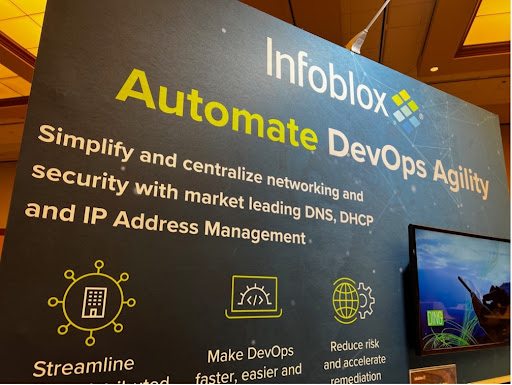Recently I attended AnsibleFest 2022 with the Infoblox team. I wanted to note several things before too much time went by. It’s been a few years since Covid made such a mess of things, and Infoblox hadn’t attended AnsibleFest in person until this year. It was a great show. But what jumped out to me? First, most visitors to our booth were existing Infoblox customers. Not bad!

I estimated that most were already automating their application workloads with Ansible, with a significant portion integrating our core network services (DNS, DHCP, and IP Address Management, or “DDI”) into their provisioning and de-provisioning tasks. Many seemed to be “dipping their toes” into this, testing various features to see what they could achieve. Even so, it was terrific to hear from our customers who visited our stand and explained how they already utilized a combination of Red Hat Ansible automation and Infoblox DDI.
Infoblox NIOS Collection for Ansible
It also makes perfect sense! As the transition to virtualized (and containerized) architectures picks up speed, environments become more dynamic, and in turn, traditional core network service systems have been severely taxed. Businesses rely significantly on technologies to automate or coordinate processes so that new servers or applications can be deployed with only one request. A configurable, consolidated, and granular view of all DDI data is made possible by the Infoblox NIOS Collection for Ansible (recently updated), which offers an automated solution to manage DDI across many platforms.
A DNS problem? Not Even I Could Have Said It Better!
The dangers of diagnosing a core network services issue on a global edge-based application were highlighted in the morning session, according to a client who stopped by the booth. As a new component of the puzzle, Event-Driven Ansible was introduced by a keynote speaker, who urged the audience to think about the implications of not just generating alarms about operating conditions but also leveraging the event data as a trigger for automated actions.
What specific operating condition alert did they emphasize, too? a DNS issue that caused a global application to crash. This was an excellent illustration because it demonstrated a real-world problem that arises when core network services technologies aren’t updated to support contemporary apps. (Side note: I adored the one engineer’s essentially saying, “No, it’s not DNS! Okay, DNS may maybe be the issue.”
Many of the customers I spoke with regularly run Ansible playbooks and upload content via an API, and many of them incorporate Infoblox DDI into their application deployment strategies. What if consumers could connect to sources of real-time event information and take selected action on particular events rather than just automating rollout?
Customers can specify particular event triggers that run on-demand as needed, recognize critical events (such as a DNS record problem), and then resolve them with rules-based actions, as seen in their Event-Driven Ansible example.
Many enterprises already have a process in place for application tracking. These tools may be excellent in a silo but useless if the team cannot resolve problems quickly and effectively. Engineers in charge of site reliability don’t want to deal with many issues that come from the raw event stream. They want problems to be fixed automatically, predictably, and swiftly. To solve this problem, engineers can use Event-Driven Ansible, which enables them to programmatically generate an action for an event based on a single message.
A Good Use Case for Future Infoblox Integration?
The Infoblox NIOS Collection for Ansible enables organizations to confidently handle the most demanding IPAM, DNS, and DHCP requirements in every network environment, data center, and hybrid cloud environment. It seamlessly automates and centralizes all aspects of IP address provisioning and reliable DHCP server management with DNS through an integrated platform. There are already some fascinating use cases in addition to incorporating fundamental network functions into application activities. Customers can use Infoblox DNS Traffic Control (DTC) and Red Hat Ansible Automation Platform to manage DNS-based global server load balancing (GSLB). To speed up threat reaction times and increase the effectiveness of security teams, they can even automate security event responses.
Event-Driven Ansible (currently available as a developer preview) will provide a scalable, responsive automation solution. It can analyze events with specific, actionable intelligence, decide the best course of action, and then execute automated activities to address or correct the occurrence. I loved the DNS example, which could be a perfect fit for our DDI capabilities.
How do you feel? Do you have any ideas on how to increase the effectiveness of your teams using event-driven core network services automation? Please let me know!









